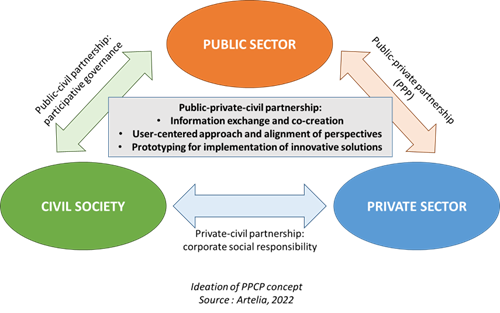The Co-Creative Improved Understanding and Awareness of Multi-Hazard Risks for Disaster Resilient Society (C2IMPRESS) consortium attended their 1st General Assembly meeting on 2-3 May 2023 in Egaleo, Greece.
Collaboratively carried by sixteen partners from different backgrounds, the C2IMPRESS project aims at improving the understanding and awareness of natural disasters (mainly floods, heatwaves, forest fires, landslides and earthquakes) and the multidimensional impacts they generate on a given territory.
The EU-funded C2IMPRESS project increases public awareness on multi-hazard risks. It aims to move the discussion away from the traditional ‘hazard-centric’ approach to a novel ‘place and people’-centred integrated multi-hazard risk and resilient assessment framework. The project develops several breakthrough innovations, such as a multi-hazard risk intelligence network platform supported by the robust Earth System Dynamic Intelligence and a suite of technologies to empower citizens and society with climate actions.
The highlights from the two days event were the sessions at the 1st General Assembly Meeting and the Public-Private-Civic-Partnership (PPCP) Workshop.
General Assembly Meeting
The meeting was inaugurated by a representative from the Municipality of Egaleo. The two day sessions mostly consisted of presentations by all the partners of each work packages (WP) describing the work progress of the project so far.
The first day of the Assembly started in morning with the collaborative presentation by SAMPAS and Technovative Solutions Limited (TVS) on ‘Project overall update and Administrative, technical and financial management’; followed by Universitat de les Illes Balears (UIB) presenting about ‘Understanding multi-hazard risk, its challenges and C2IMPRESS project specifications’; Meteoceanics Institute for Complex System Science (MET) presented about ‘System-of-Systems ESDI platform and holistic Multi-hazard Risk intelligence network’ ; National Center for Scientific Research ―Demokritos (NCSRD) presented about ‘Multi hazard risk management, exposure, and resilience framework’; Technovative Solutions Limited (TVS) ‘Platform for decision making processes for a disaster resilience society’. Second half of day one started with the presentation by Istanbul University (IU) on ‘Social innovation, Citizen engagement, collaboration, and interaction’ ; followed by TVS’s presentation on ‘Dissemination and exploitation activities & project visual identity’. The day ended with Laboratório Nacional de Engenharia Civil, I.P (LNEC)’s presentation on ‘Pilot implementation / demo sites: updates’.
The second day of the Assembly started by the PPCP workshop* overview that was held a week ago. The session was demonstrated by Artelia. Later in the day, there were presentations by TVS on the ‘Citizen Engagement Platform’ and a few more collaborative sessions by the consortium partners.
The meeting ended with a note from the Mayor of the Municipality of Egaleo, Mr Ioannis Gkikas. The municipality of Egaleo is the first pilot site to test the innovative solutions of the C2IMPRESS project, on an experimental basis. Based on the results in this city, the tools and solutions will be refined for application in the other pilot sites.
*Public-Private-Civic-Partnership (PPCP) Workshop
One of the sub-objectives of the C2IMPRESS project is to design a method that promotes the participation of both public, private, and civil society stakeholders in the debate around resilience to natural disasters.
C2IMPRESS consortium organised a two-day long Public-Private-Civic-Partnership (PPCP) workshop on 27-28 April 2023 in Egaleo, Greece. The workshop was hosted by the Municipality of Egaleo and led by Artelia and NCSR "DEMOKRITOS".
The PPCP approach aims at:
- Bringing together stakeholders with different values and objectives around a common cause (building resilience towards disasters);
- Co-creating and co-designing solutions with simple participative and creative tools and methods, inspired by methods such as Design Thinking and Living Labs;
- Networking all these stakeholders and develop the collective intelligence of these groups on a given territory.
The expected outcomes from the approach include:
- Solutions adapted to the local context are co-created by local stakeholders
- An autonomous governance network for each CSA is created
- The benefits and outreach of project results are maximized
- Collective intelligence and public awareness are improved
- The sharing of knowledge, beneficial experiences and good practices regarding disaster management and climate change resilience is fostered.
The diverse kind of stakeholders for the public, private and civic partnership include the municipality, administrations, public services from the public sector; companies, associations or organizations which do not depend directly on the State, its administration and/or local authorities from the private sector; and Civil Society Organizations (CSOs); research/education (including primary, secondary and higher education and research institutes) and the media from the civil society.
